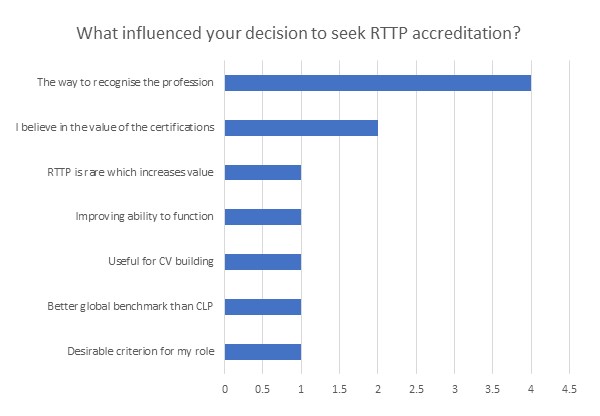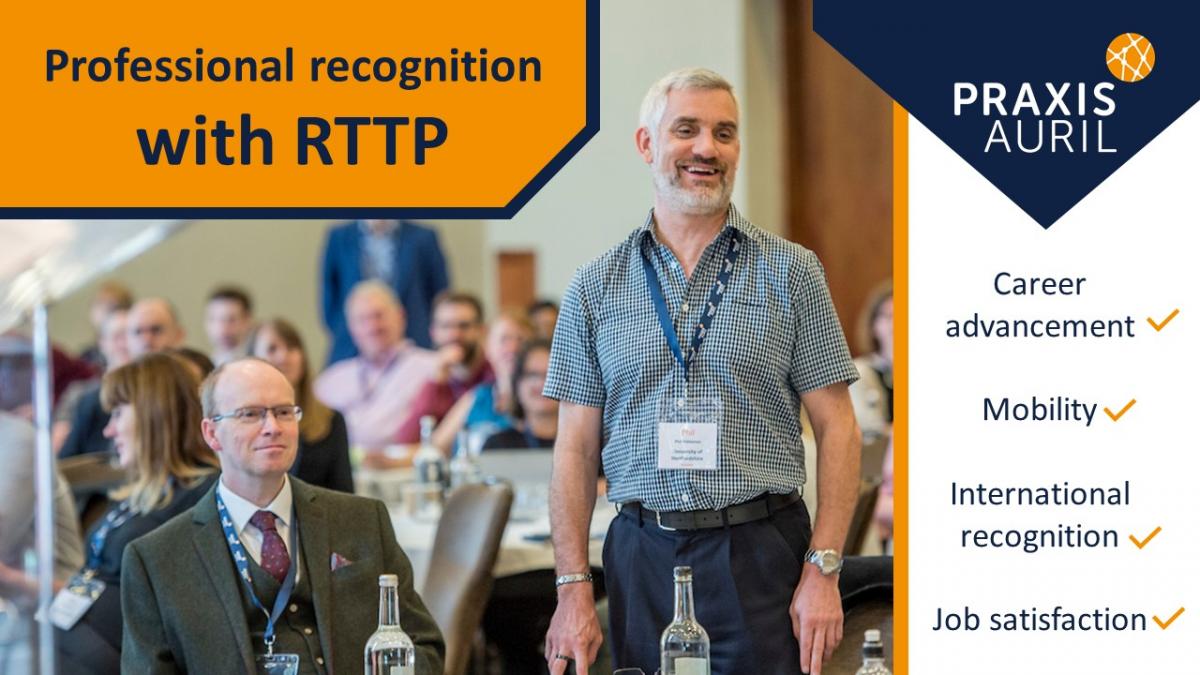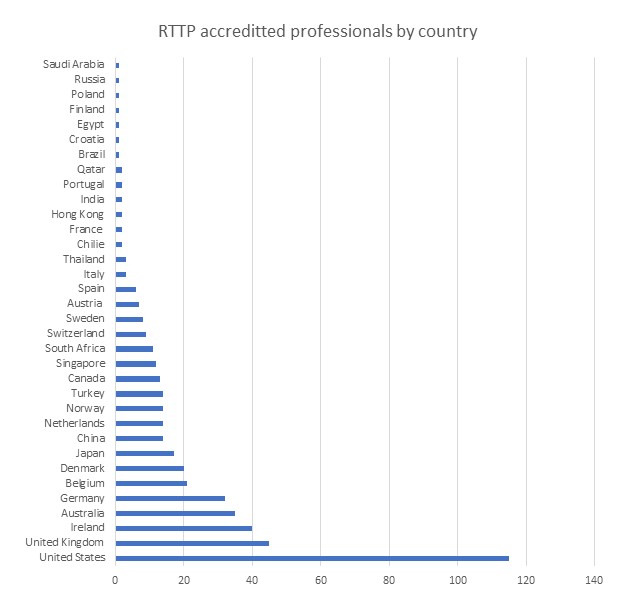“Choose courses relevant and of interest to you. RTTP accreditation will naturally follow.”
That was one of most referenced tips from those already accredited with RTTP in a recent interview series conducted by MarComms Manager Craig Smith. In the short 6 blog series, Craig interviewed RTTP accredited Knowledge Exchange practitioners from a wide range of organisations including; GSK, Public Health England, Science & Technology Facilities Council – UKRI, Waterford Institute of Technolog, Burnside Development and Associates and University of Vienna.
Professional recognition and the value of certifications

Q1: What influenced your decision to seek RTTP accreditation?
Professional Recognition was the top cited response from those interviewed, with many referencing that certifications were the preferred way of gaining professional recognition. In fact, one person interviewed found it a better benchmark than Certified Licencing Professional (CLP).
However, it is clear that professional recognition can be obtained in more ways that RTTP. Not just a view from the interviewees, but also echoed in the comments from the PraxisAuril community. After all, RTTP is just one method for professional recognition. For some KE practitioners, experience is the preferred method. For others, it is trust and reputation in the community achieved by building the right network. For others, it is their current role in a particular organisation that symbolises competence in knowledge exchange.
One thing often missed when I’ve spoken to the KE community though, is that RTTP does, in fact, incorporate many of the other indications of proficiency in KE. The criteria to apply is to have 3+ years’ experience in KE, 60 RTTP points (or other qualifications) and evidence of applied skills and experience on a project. The application process requires you to submit your CV as evidence as well as document a project which would not have been achieved without your KE skills and experience. Without this experience and evidence, RTTP accreditation is not possible.
In this respect, RTTP symbolises a strong CV and expertise applying skills and experience to projects and creating impact. Those 4 letters represent to the world and wider community that you have this experience and these skills. You don’t need to submit your CV or expand on your skills and experience with every interaction.
RTTP is just a symbol, the quality of that symbol is dictated by those that represent it. Looking at the elite 400 currently accredited (and the six I interviewed), the representation on RTTP is of a very high standard. As one interviewee said, “RTTP is rare which increases value”.
Select your training courses in conjunction with your professional development plan and RTTP accreditation will naturally follow
It was interesting that only 2 of the 6 people interviewed planned their path to RTTP accreditation. In the 4 cases which were not planned, when the practitioner first learned of RTTP they were already qualified to apply by having enough points or by having considerable experience in KE. The key sentiment here, for me, is that your professional development is the first and foremost driver. Early in your career look for training and courses which enable you to perform better in your role or that interests you. Regardless of who hosts or organises the courses/training. I say that because one avenue to obtain RTTP is by documenting the training or qualifications achieved, with or without points.
It is important to note though, that a route through RTTP points is more straightforward. Alliance Associations like PraxisAuril are approved to award RTTP points with their courses. This means those at ATTP who review applications can see that the KE practitioner has points verified by PraxisAuril. There is no need to check what the course was, who the trainer was or judge if the experience or skills gained are adequate. Much like RTTP itself, RTTP points symbolise professional training appropriate for an expert in the field. Regardless of where, when or by whom the training was provided by. Both of those practitioners interviewed who did plan their RTTP accreditation also attended conferences to continue to learn and build strong networks. Conferences from PraxisAuril also carry RTTP points, as you could put 30 RTTP training points and 30 RTTP conference points towards RTTP accreditation.
Focusing on training and increasing capabilities in your role was mirrored in the answers from the two practitioners who did plan their route to accreditation. Both chose courses based on gaps in their knowledge, both personally and within their KT Office. RTTP points where a consideration to choose an Alliance Association for training requirements, but what course to pick was down to their professional development requirements.
Any practitioners who have been in their role for over three years could demonstrate the same skills and experience with their career history alone. Here a CV and well documented project demonstrating the core 5 capabilities of an RTTP accredited professional are all that is required.

Q2: Did you plan your path to RTTP accreditation?
NO
- PraxisAuril was preferred learning and development provider and through learning, I accumulated RTTP points and from this decided to seek accreditation.
- I undertook lots of training once joining the profession to upskill and accumulated RTTP points and from this, I decided to seek accreditation.
- My experience of running workshops, successfully securing deals, mentoring and giving lectures lead to the community electing me as President of AUTM. At AUTM I was present in RTTP discussions/implementation and then sought accreditation then.
- I became eligible for RTTP through my experience alone and was introduced to the accreditation after achieving this experience.
YES
- Planned from point of increasing my capability in the job.
- I choose courses based on gaps in knowledge both personal and within the KT office.
Awards, new career opportunities and positive engagement – Professional and personal life after RTTP accreditation
Q3: Since becoming RTTP accredited has anything changed personally or professionally?
The answers clearly fell into two distinct categories. On one hand, KE practitioners mentioned winning awards, being referenced as showing good practice, getting new career opportunities and a feeling of greater trust and security from clients. One interviewee even mentioned something as simple as getting congratulations from colleagues.
However, on the other hand, I sense disappointment from the interviewees.
“Relating to my role in the UK, limited impact, unfortunately. Not sure RTTP is treated with the same respect in the UK as in other countries”
“No, it seems RTTP is not as well known in the UK as in other countries”
Indeed, RTTP is a global accreditation with Alliance Associations like PraxisAuril spread around the world to support not only the accreditation but more broadly professional development of KE practitioners, everywhere. A quick check of the ATTP website reveals that, currently, there are RTTP accredited professionals in 36 different countries.
Hearing that RTTP is treated with less respect in the UK is something I have heard before from the wider KE community. In fact, it still seems many people have not heard of RTTP in the UK which was the main reason for this blog series in the first place. However, even if collaborations between industry and academia in the UK don’t factor in RTTP as an indication of KE proficiency, people from outside of the UK are likely to. Dig a little deeper into the ATTP website and you can see countries like Australia, Denmark, Germany and even close neighbours Ireland greatly value RTTP.
Furthermore, we have seen a huge surge in KE training and RTTP accreditation in countries like China and Japan in 2018. So, although UK-to-UK collaborations may not be influenced by RTTP currently, collaborating with other countries could be. RTTP is a universal language, with countries like the US leading the way and many other countries following suit. From our perspective at PraxisAuril, we want the UK leading the way alongside these countries, setting the bar for not only RTTP but also KE globally.

Thinking of applying for RTTP or Candidate Pathway? Here is some advice from those already accredited.
Q4: What advice would you give a fresh KE professional looking to become RTTP accredited?
FOCUS ON THE TRAINING:
- Select your training courses in conjunction with your professional development plan (RTTP accreditation will naturally follow)
- Choose courses that are of interest to you
- For early career professionals, use training and RTTP points to add further routes to RTTP accreditation
- Pre-reading event materials will give you time to make connections and think about reflective practice and “show and tell” your achievements and competencies
- Undertake PraxisAuril training and carefully document your involvement cases
LOOK FOR SUPPORT/GIVE SUPPORT:
- Use Candidate RTTP Pathway and reach out to RTTPs
- Volunteer to help others in the profession and mentor people with less experience
ATTEND CONFERENCES:
- Attend annual conferences and network with colleagues in the field for an unparalleled insight into how other institutions operate
USE YOUR EXPERIENCE:
- Do not discount using experience as your route to RTTP
SUPPORT THE MEANING OF RTTP:
- RTTP is a global standard for KE, the more people getting accreditation in the UK, the more it can be treated with the same respect as other countries
Applications tips from those already RTTP accredited
TRAINING COURSES:
- Fundamentals of Technology Transfer 2015
- Conference 2015
- Essentials of Business Development 2015
- New Venture Creation 1 2016
- Software Commercialisation 2016
- Practical Licensing 2017
- ASTP Annual Conference 2015
- PraxisUnico Research Contracts 2015
- ASTP Software Challenges 2016
- ASTP Annual Conference 2016
- AUTM Conference 2017
SUPPLIED CASE STUDIES:
- https://www.gov.uk/government/case-studies/public-health-england-phe
- https://stfc.ukri.org/news/introducing-the-new-energy-saving-tuneable-ma...
- I used a situation where I lead a key licence negotiation. In this case, I rewrote the commercial case of an existing patent from our portfolio, convinced the inventor of the new commercial case, identified a commercial partner and negotiated a licence.
- My most challenging and rewarding agreement executed to date was the negotiation of a DPAc (Discovery Partnerships with Academia) joint collaboration and licensing deal with the Rappaport Institute in Israel. I acted as sole transactor on the deal, leading negotiations with the Institution, and progressing from the preparation of the first draft of the collaboration & licencing agreement through to execution of the eventual deal.
GSK had previously executed a small number of DPAc deals with academics in the UK and Europe (indeed I was responsible for the first DPAc deal outside of the UK), and as such had developed ‘standard’ deal terms for DPAc projects. These terms broadly consist of GSK taking a licence to the existing background intellectual property (IP) of the academic institution, providing research-based funding to support the development of the project, and milestone and royalty-based payments upon the development and commercialisation of a successful product. However, due to the complexities of this particular project (which was for a biological agent rather than a small molecule), previous deal terms were not suitable or appropriate for the project with the Rappaport Institution.
On this deal, I worked with colleagues in GSK’s Legal group, Global Patents attorneys, and the biologists who were to develop the asset, to identify an approach which was free from any third-party licenses and was also free to licence back to the Rappaport Institute should GSK decide not to progress the eventual asset. I drafted an agreement incorporating a revised and unique termination option, but which also contained more standard licensing and collaboration terms. I negotiated the agreement to include a substantial up-front licence payment, staged milestone payments, and single-digit royalties on an eventual product. Due to the complexities of the termination clauses, I also negotiated a reverse-royalty rate so that GSK would receive payments should the project be terminated by GSK but further developed by Rappaport (with or without a third-party partner). This unique agreement is now used as an exemplar within GSK for DPAc collaborations involving biological agents.
The Interviews
RTTP: Value of certifications - An interview with John A. Fraser, RTTP, CLP
RTTP: Improving ability to function - An interview with James O'Sullivan RTTP
RTTP: A better global benchmark - An interview with Professor S.S. Vasan RTTP
RTTP: Useful for CV building - An interview with Dr Liam Brennan
RTTP: Trust and security in my work - An interview with Dr. Tom Withnell RTTP